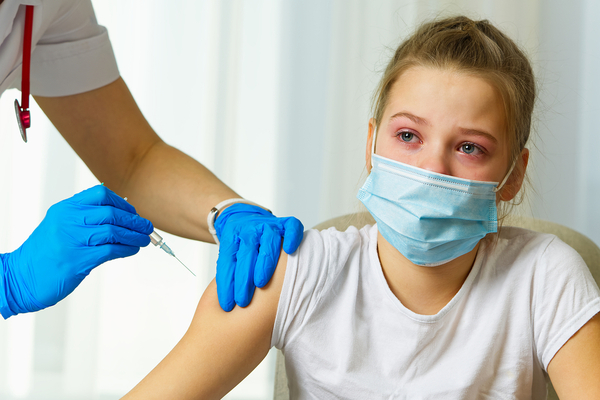On Thursday, the Centers for Disease Control and Prevention signed off on booster shots of the Pfizer-BioNTech Covid-19 vaccine for children ages 5 to 11. The final endorsement, from CDC Director Rochelle Walensky, came hours after the agency’s Advisory Committee on Immunization Practices voted 11-1, with one abstention, in favor of giving 5- to 11-year-olds the boosters at least five months after their second dose.
“Today, I endorsed ACIP’s vote to expand eligibility for Covid-19 vaccine booster doses,” Walensky said in a statement. “Children 5 through 11 should receive a booster dose at least 5 months after their primary series.” Walensky’s sign-off comes as Covid-19 cases are surging yet again in the United States, fueled by the omicron subvariant, BA.2, and an offshoot of that strain, called BA.2.12.1.
Vaccination rates for children 5-11 in the U.S. have “lagged behind other age groups leaving them vulnerable to serious illness,” Walensky said. Only 28% of the 28 million kids in this age group have received two doses of a Covid-19 vaccine, according to data from the CDC, much lower than the overall population. While children are generally less likely than adults to get seriously ill from Covid, some do: more than 15,000 children ages 5 to 11 have been hospitalized and at least 189 of them have died, CDC data shows, and unvaccinated children in that age group were hospitalized at double the rate of vaccinated children during the beginning of the omicron wave.
Though COVID-19 hospitalizations remain far below January’s peak, the CDC reported weekly hospitalizations among children increased 8.4% during the second week of May.
As NBC News reports, the panel convened two days after the Food and Drug Administration authorized booster shots for this age group. Clinical trial data presented by Pfizer representatives at Thursday’s meeting showed a 10 microgram booster dose for children 5-11 — a third of the dosage given to people 12 and up — raised antibody levels against both the omicron variant and the original strain of the coronavirus, which has long been out of circulation.
The omicron variant tore through the pediatric population this past winter, even among the vaccinated. In February, researchers from the New York State Department of Health reported that two doses of the Pfizer vaccine offered little protection against infection for children 5-11 during the omicron wave, though the CDC found it did still protect against severe illness.
While vaccinated children should be allowed to get an additional dose, there should be a bigger push by public health officials to get unvaccinated children their first two shots, said committee member Dr. Sybil Cineas, the associate program director for the Brown Combined Internal Medicine-Pediatrics Residency Program. “As a primary care provider, it’s hard for me to be having a discussion about these sorts of issues when only 28 percent have their primary series,” Cineas said.
Only children younger than 5 remain ineligible for Covid vaccines, a sore spot for many parents and doctors across the country eager to vaccinate their youngest. Dr. Doran Fink, a deputy director of the FDA’s division of vaccines, told the committee that regulators are working quickly to review the data. Fink said Moderna’s vaccine application to the FDA for children ages 6 months to 5 years was completed “just recently,” and the agency is working to bring the request to its advisory committee as “rapidly as we can.” A final decision on that vaccine is expected in June.
—
Photo Credit: VidEst / Shutterstock.com
